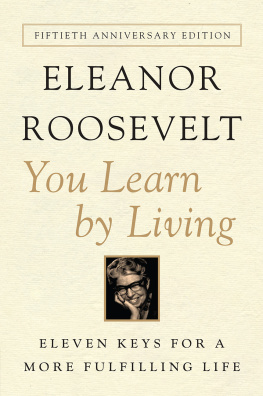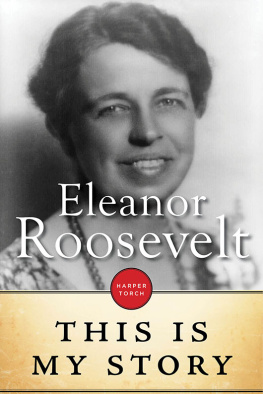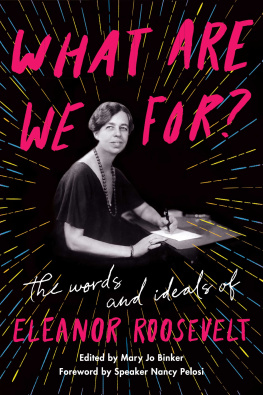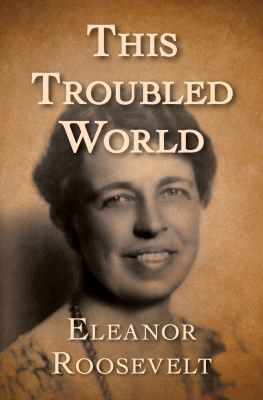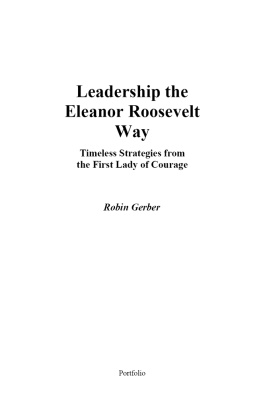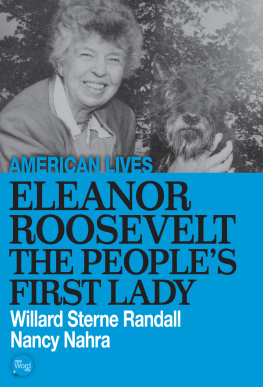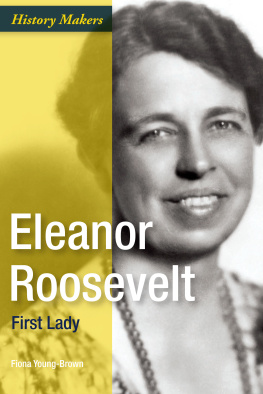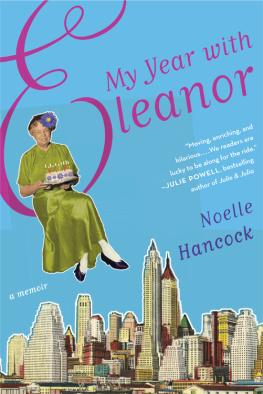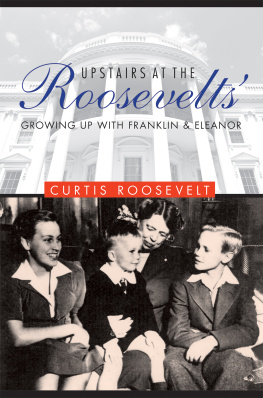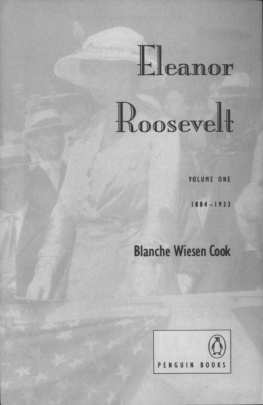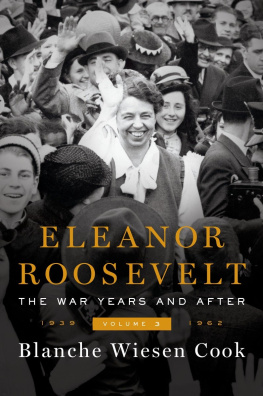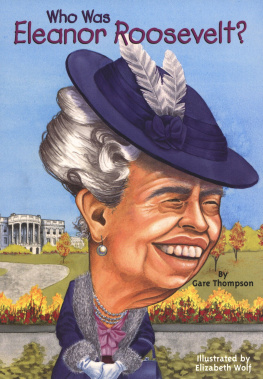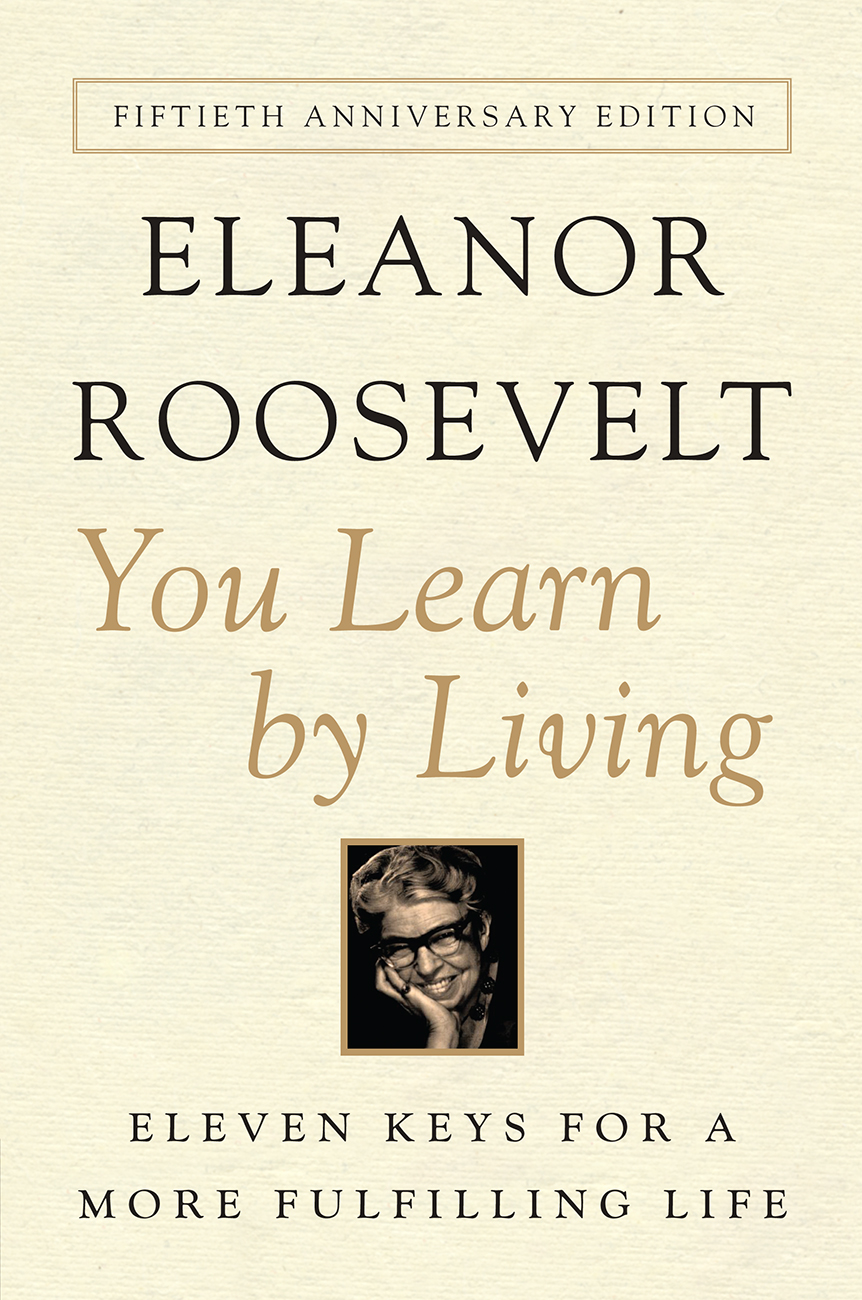To my grandchildren and great-grandchildren in the hope that sometime they may find a little help in these pages
I want to express my very warm gratitude and thanks to Miss Elinore Denniston, whose work with me made this book possible, and also to Miss Nannine Joseph for her wise counsel in any work that I undertake.
E. R.
O VER the years I have received hundreds of thousands of lettersat the present time about a hundred a day. The vast majority of them contain questions that run the gamut from the personal problems that beset us all to the world problems that, now and henceforth, also beset us all. What these letters add up to is this: What have you learned from life that might help solve this or that difficulty?
Of course, no one is equipped with such wisdom. No one is adequate to give such blanket answers. No one finds ultimate solutions. But the questions are questions we all meet in our lives; they are questions we must all answer in some way. Not with finality, for life is too fluid, too alive for that. So I have been forced to stop and think through some of the questions, to try to find my own answers, to discover what I have learned by living.
When one attempts to set down in bald words any answers one has found to life problems, there is a great risk of appearing to think that ones answer is either the only one or the best one. This, of course, would be nonsense. I have no such all-inclusive wisdom to offer, only a few guideposts that have proved helpful to me in the course of a long life. Perhaps they may steer someone away from the pitfalls into which I stumbled or help them to avoid the mistakes I have made. Or perhaps one can learn only by ones own mistakes. The essential thing is to learn.
Learning and living. But they are really the same thing, arent they? There is no experience from which you cant learn something. When you stop learning you stop living in any vital and meaningful sense. And the purpose of life, after all, is to live it, to taste experience to the utmost, to reach out eagerly and without fear for newer and richer experience.
You can do that only if you have curiosity, an unquenchable spirit of adventure. The experience can have meaning only if you understand it. You can understand it only if you have arrived at some knowledge of yourself, a knowledge based on a deliberately and usually painfully acquired self-discipline, which teaches you to cast out fear and frees you for the fullest experience of the adventure of life.
My own life has been crowded with activity and, best of all, with people. I have seen them wrest victory from defeat; I have seen them conquer fear and come out strong and free; I have seen them turn empty lives into full and productive ones.
I honor the human race. When it faces life head-on, it can almost remake itself.
Ones philosophy is not best expressed in words; it is expressed in the choices one makes. In stopping to think through the meaning of what I have learned, there is much I believe intensely, much I am unsure of. But this, at least, I believe with all my heart: In the long run, we shape our lives and we shape ourselves. The process never ends until we die. And the choices we make are ultimately our own responsibility.
Hyde Park
January, 1960
O NE of the most intriguing questions that comes to me in the mail is: How did you plan your career and how did you prepare for it? I always feel perfectly inadequate to answer this because I never planned a career and never prepared for it. To this day I do not feel I have had a career. What I have done is to live every experience to the utmost.
As I look back, I think probably the factor which influenced me most in my early years was an avid desire, even before I was aware of what I was doing, to experience all I could as deeply as I could.
I must have been no more than five when I went on a trip to Italy with my father and mother. In Venice, my father invited me to ride in a gondola and he paid the gondolier to sing. Some sort of fiesta was going on at the time and people were tossing flowers. I can still remember that ride. Baby that I was, I had the sense to feel it as an experience.
Everything I did with my father remains in my memory today, a vivid moment not to be forgotten. I remember standing on the edge of Vesuvius with him while he threw in a penny, which came back covered with lava. There was excitement and wonder in that. He took me through the ruins and showed me a petrified loaf of bread and told me how a long-vanished civilization had lived. But it wasnt dead history. It became vivid to me. These were living people, and as I learned about them they seemed as real as the ones about me.
What I have learned from my own experience is that the most important ingredients in a childs education are curiosity, interest, imagination, and a sense of the adventure of life. You will find no courses in which these are taught; and yet they are the qualities that make all learning rewarding, that make all life zestful, that make us seek constantly for new experience and deeper understanding. They are also the qualities that enable us to continue to grow as human beings to the last day of our life, and to continue to learn.
By learning, of course, I mean a great deal more than so-called formal education. Nobody can learn all he needs to know. Education provides the necessary tools, equipment by which we learn how to learn. The object of all our education and all the development which is a part of education is to give every one of us an instrument which we can use to acquire information at any time we need it.
I remember certain milestones in learning how to learn. As far as training my memory was concerned, that began very young. I loved poetry and I would often learn it while I was dressing and undressing. When I was quite young, I had a French teacher who made us learn by heart a good part of the New Testament in French. This was helpful later when I was in a French school in England. The French mistress had us listen to her read a French poem, of perhaps eight lines, and repeat it after the first reading. At first I could not do it, but gradually I was able to manage fairly well.
She taught us history and, though we were only fifteen or sixteen, I imagine her methods were more like those of a college professor. We sat on little chairs on either side of her fireplace, over which maps were hung. She would turn to the map of the area of the world we were learning about and tell us to remember our geography because it affected history. Then she would give us a list of books to read and take up the particular point we were studying, giving us as many different lights on the period as she thought we could understand. Our requirement was to do our reading and then write a paper on the assignment.
The English girls were apt to remember what she had said and repeat it in their papers. I can still see her, as one of the girls was reading her paper aloud, standing over her with a long ruler in her hand, taking away the paper, and tearing it up.
You are giving me back what I gave you, she said, and it does not interest me. You have not sifted it through your own intelligence. Why was your mind given you but to think things out for yourself?
It became a challenge for me to think about all the different sides of a situation and try to find new points that Mlle. Souvestre had not covered, points that had not even been covered in our books. It was rather exciting to have these questions come to my mind as I read and I can remember now how pleased I was when she would ask me to leave my paper with her and later return it with the comment, Well thought out, but have you forgotten this or that point?

